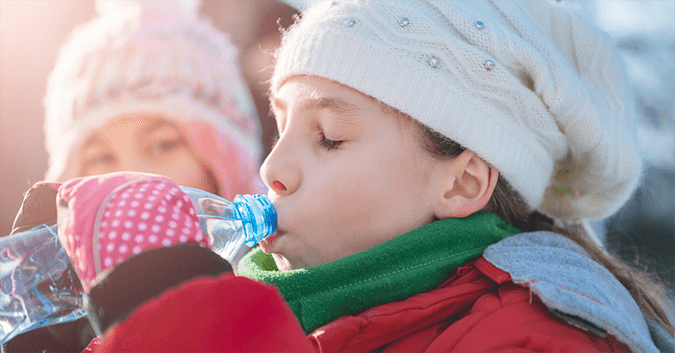
Winter Dehydration
One common question our staff hears this time of year is: Can you become
dehydrated in the winter? The answer is yes. Read on to learn more about
the importance of staying hydrated during colder seasons.
Why Dehydration Occurs
Dehydration happens when your body loses too much fluid—more specifically when
you’re losing more fluid than you are taking in. When this happens,
your body does not have enough water to perform regular functions properly.
You can lose excessive amounts of fluid from your body in
the following ways:
- Sweating too much
- Urinating too much
- Not drinking enough water
- Diahrrea
- Vomiting
- Fever
Signs and Symptoms of Dehydration
Common symptoms of dehydration may include:
- Increased thirst
- Fatigue
- Dry mouth
- Headache
- Dry skin
How to Keep From Overheating
During colder weather, you are prone to dehydration because your sweat
evaporates more quickly in the cold, dry air. Here are some tips to keep
you from overheating and becoming dehydrated.
Wear Light and Removable Layers
Although we tend to bundle up and wear layers to preserve body heat, the
added bulk and weight can actually cause you to overheat, producing more
sweat and losing more fluids.
Be sure to wear light and removable layers that you can take off when you’re
starting to feel hot to prevent overheating. This way, you can put them
back on when you need them.
Some removable and layering-friendly clothing items to consider may include:
- Gloves and mittens
- Cardigan
- Zip-up sweatshirt
- Scarves
- Knit hat
- A jacket with a hood
Remember to Drink Water, Even When You Aren’t Thirsty
Whenever you can see your breath as you exhale during cooler temperatures,
your body is losing fluids through these water vapors. While your body
continues to lose water and fluids through respiration, your body may
not let you know that you’re thirsty. For this reason, you should
make it a point to drink water throughout the day to stay hydrated.
When to Seek Medical Attention
Although, more often than not, dehydration is mild, it can also be life-threatening.
You should seek immediate medical attention if you experience any of the
following symptoms:
- Not urinating
- Dark urine
- Rapid heartbeat
- Rapid breathing
- Dizziness or lightheadedness
- Fainting
Walk-in-Clinic in Gillette, Wyoming
If symptoms persist or last longer than a few days, the
Walk-in Clinic in Gillette, Wyoming, is here to help. When it comes to urgent care, each
patient can expect us to help them get back to life with quality care
and personalized service.
Save your spot in line or walk-in today! Learn more at
www.cchwyo.org/wic.